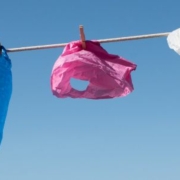24 January 2023
Danone, one of the largest food producers in the world, has been charged in France for the lack of having a serious plan of action to reduce its plastic footprint. According to the plaintiff, three NGOs, this type of plan is obligatory under French law.
With an annual turnover of more than EUR 24 billion, Danone sells dairy products and water in 120 countries. They are largely on sale in single-use plastic packaging that is thrown away after use. Some of that packaging enters the environment.
DANONE AMONG THE WORLD’S BIGGEST POLLUTERS
Year after year, counts of brands in clean-up activities show that Danone is one of the biggest polluters in the world. A multinational like this should have a policy that focuses on using less plastic. The opposite appears to be the case with Danone as it uses more and more plastic every year. In 2020 it was 716,000 tonnes, and by 2021 this had jumped up to 750,000 tonnes of plastic.
CIRCULARITY IS JUST A FRONT
Danone explains its plastic policy on its websites. The company is striving to make packaging ‘circular’. In other words, all packaging should be reusable, recyclable or compostable by 2025. Further, it is striving for a higher percentage of recycled plastic in the packaging. These measures, mostly targeted at optimising recycling, is not reducing the risk of plastic ending up in the environment. And this is not the only problem by far.
‘DANONE MUST TAKE THE PLASTIC POLICY SERIOUSLY’
Apart from companies like Coca-Cola and Unilever, Danone is one of the biggest causers of the plastic soup. According to the plaintiff, the multinational completely failed to do what it was supposed to do under French law which are to:
- analyse the impact of its plastic usage on the environment, climate, health, and human rights throughout the chain, that is to say from the use of the raw materials up to and including the waste phase; and,
- estimate its own plastic footprint, not only in terms of the plastic used for all packaging, but also for things like transport and storage.
The plaintiff – ClientEarth, Surfrider and Zero Waste France – believe that Danone should issue a ‘deplastification plan’. In the plan, the company should define targets for how and when the assessed risks will be dealt with. It should then comply with that plan.
PREVIOUS COMPLAINTS AGAINST AHOLD DELHAIZE
In 2021, ClientEarth and Plastic Soup Foundation submitted a complaint to the Dutch Authority for the Financial Markets against Ahold Delhaize for breaching the clauses of the Non-Financial Reporting Directive (NFRD) by insufficiently reporting about the consequences of plastic on the environment and the associated financial consequences.
The complaint against Danone fits in the trend to address companies directly for the lack of action plans to drastically reduce their plastic usage. As a large listed company, Ahold Delhaize too needs to show the impact of the plastic packaging that it uses on the environment. The difference is that the AFM discusses, or has discussed, the charge with Ahold Delhaize behind closed doors, while the French court not only needs to make the verdict public, but can also oblige Danone to comply with the law.
You may also be interested in:
Supermarket group faces challenge over plastic failings
Ahold Delhaize’s plastic policy has improved but still falls short





